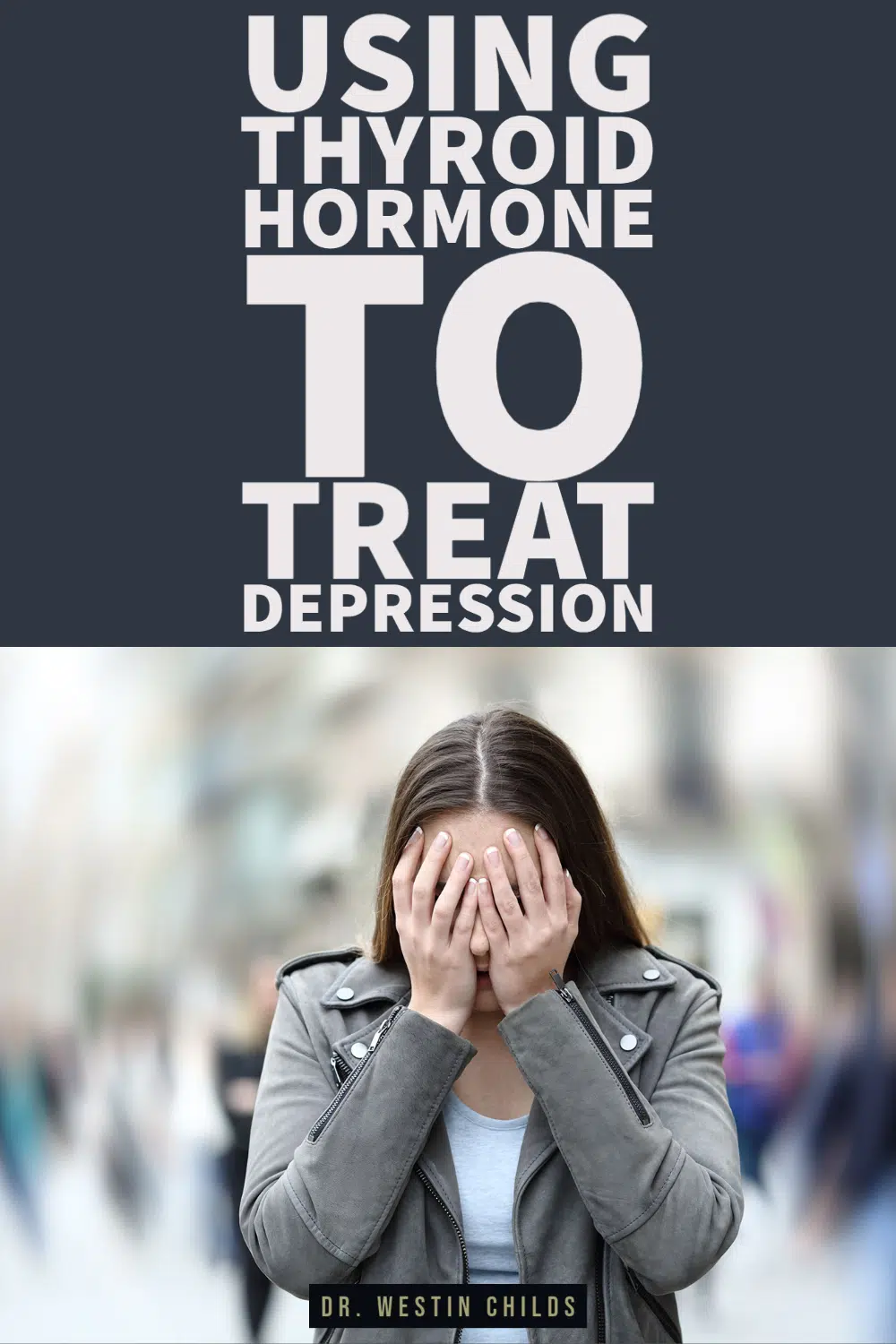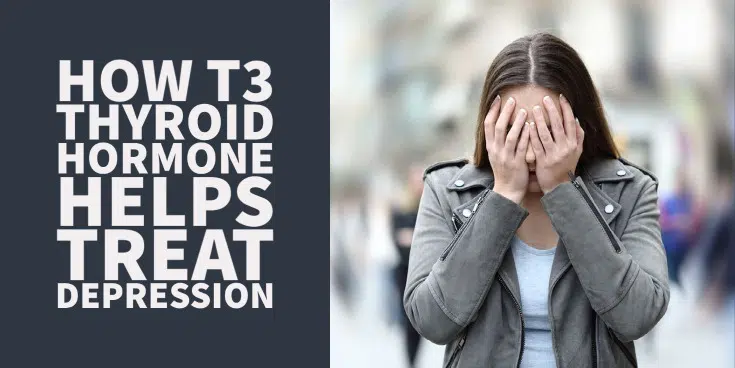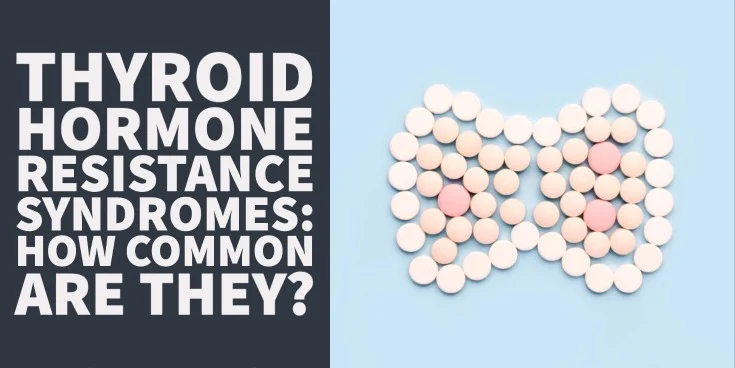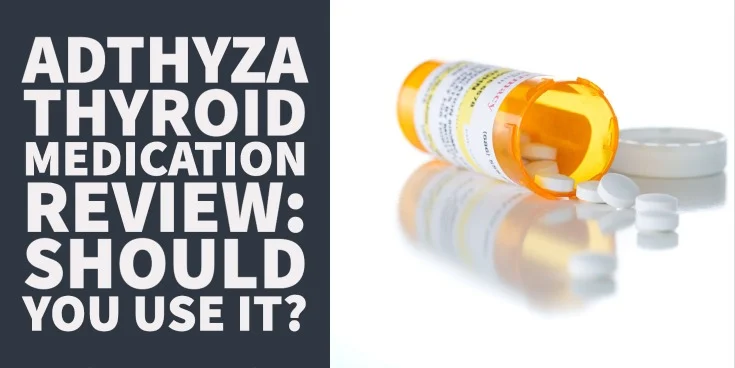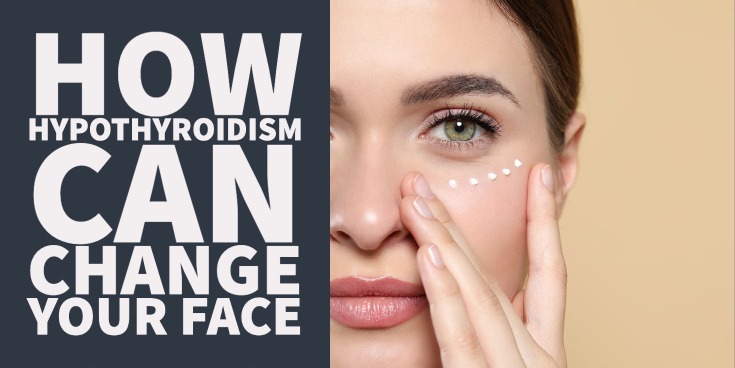Do we actually have a depression epidemic?
Or do we have an untreated thyroid epidemic?
After treating hundreds of depressed hypothyroid patients I tend to think it’s the latter.
You see…
I’ve found that treating depressed hypothyroid patients with the RIGHT kind of medication at the RIGHT dose almost completely eliminates (or at least significantly improves) the majority of “depressed” patients!
And it’s no wonder why so many hypothyroid patients are depressed.
These are just some symptoms that untreated thyroid patients deal with:
- Hair loss by the clumps
- Constant weight gain with no end in sight
- Crushing and debilitating fatigue
- Chronic pain over their entire body
How can anyone stay happy with symptoms like these?!
And yet, when you go to the doctor you are told it’s all in your head.
That’s what I want to talk about today…
How using T3 Thyroid Hormone medication can help treat and REVERSE depression in hypothyroid patients.
Let’s jump in:
DOWNLOAD FREE RESOURCES
Foods to Avoid if you Have Thyroid Problems:
I’ve found that these 10 foods cause the most problems for thyroid patients. Learn which foods you should avoid if you have thyroid disease of any type.
The Complete List of Thyroid Lab tests:
The list includes optimal ranges, normal ranges, and the complete list of tests you need to diagnose and manage thyroid disease correctly!
Is Serotonin To Blame for Depression?
The main problem with addressing and treating depression has to do with how we look at it.
We are told (Doctors and patients) that Depression is caused by an imbalance of your neurotransmitters.
Everyone would have us believe that if you are depressed you have low levels of a neurotransmitter called serotonin in your brain.
And it’s this chemical imbalance that causes all of your symptoms.
Basically, 60 years of research have proven that depression is not caused by a serotonin deficiency.
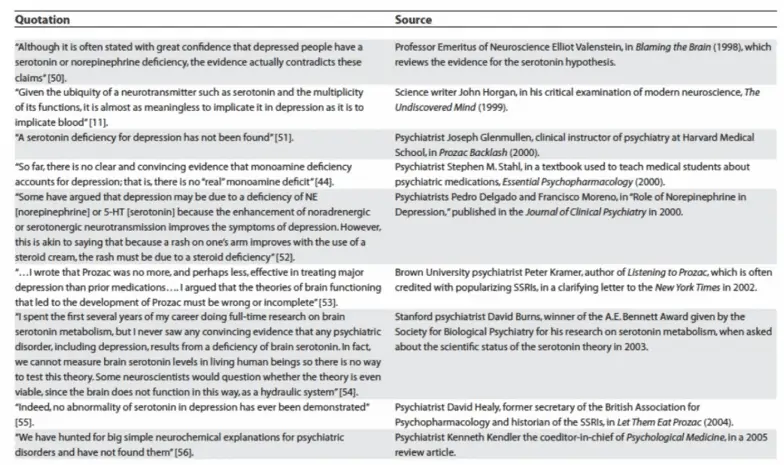
(This is an image taken from her Website with quotes from psychiatrists giving their opinions on the Debate).
So if depression isn’t caused by a serotonin deficiency, then what causes it?
What Really Causes Depression
You are made to believe that depression is caused by a single chemical imbalance because then the treatment becomes very easy – a drug.
But that just isn’t the case.
Like many other diseases, depression is caused by a number of different imbalances in the body.
Depression can be caused by any of the following:
- Hormonal imbalances (Including hypothyroidism, adrenal fatigue, low testosterone, and estrogen dominance)
- Food allergies or sensitivities
- Imbalances of fatty acids
- Emotional or physical stress
- And the list goes on…
In the real world, depression is caused by a number of different factors and in order to treat the condition, you have to find the root cause.
Based on my experience, hormonal imbalances (listed as the #1 cause above!) are the MOST common reason I see patients being depressed.
And on that list is Hypothyroidism – so let’s talk more about that.
Depression as a Symptom of Hypothyroidism
Doctors are taught this in medical school for crying out loud.
It’s even listed on the Mayo Clinic‘s main website as a symptom of hypothyroidism.
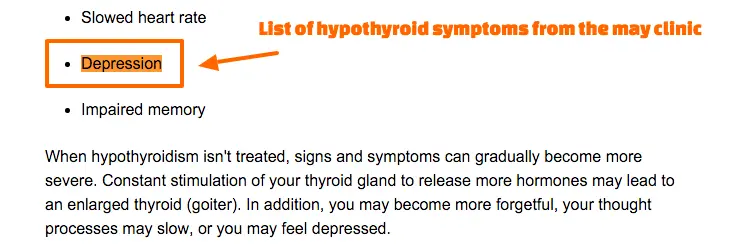
So why is it so overlooked?
Well, it boils down to a couple of reasons:
1. Reliance Upon Thyroid Serum Lab Testing
Has this happened to you before?
You just know that something is wrong, but your doctor keeps telling you that your thyroid is “fine”.
Eventually, you start to think that everything is just in your head, or that maybe you’re crazy.
I can’t tell you how many patients I find that are being undertreated when it comes to their thyroid medication.
Oftentimes, just putting them on the right type of medication or increasing their dose is enough to help significantly.
If you feel you fall into this category, read this post on how to accurately diagnose your thyroid problems.
2. Reliance Upon T4 Thyroid Medications for Treatment
Let’s provide some quick background on this so everyone is on the same page.
When I say T3 medication, I am referring to giving someone the active form of thyroid hormone.
There are 2 ways you can get this kind of medication.
Taking it by itself (the medication is called liothyronine or Cytomel).
Alternatively, you can get it in combination with T4 in the form of Natural Desiccated Thyroid or NDT.

Almost every Doctor is willing to give you T4 medication (like Synthroid) but very few are willing to give you T3 medication (like liothyronine or Cytomel).
Unfortunately, most people (about 90%) do significantly better on some form of T3 medication.
Let’s take a look at some of the studies showing the effectiveness of T3 medication in treating Depression…
Studies Showing How Effective T3 is in the Treatment of Depression
Doctors pride themselves on being “evidence-based”. Meaning, they like to base their treatment on literary studies that “prove” treatment is effective.
This is why most Doctors love to prescribe medications.
Medications can be compared to a control or “placebo”.
If the medication is superior to the placebo, by a certain margin, then it is considered to be an effective treatment.
The interesting thing is, we’ve done these studies with T3 medication.
Take a look at this study (1):
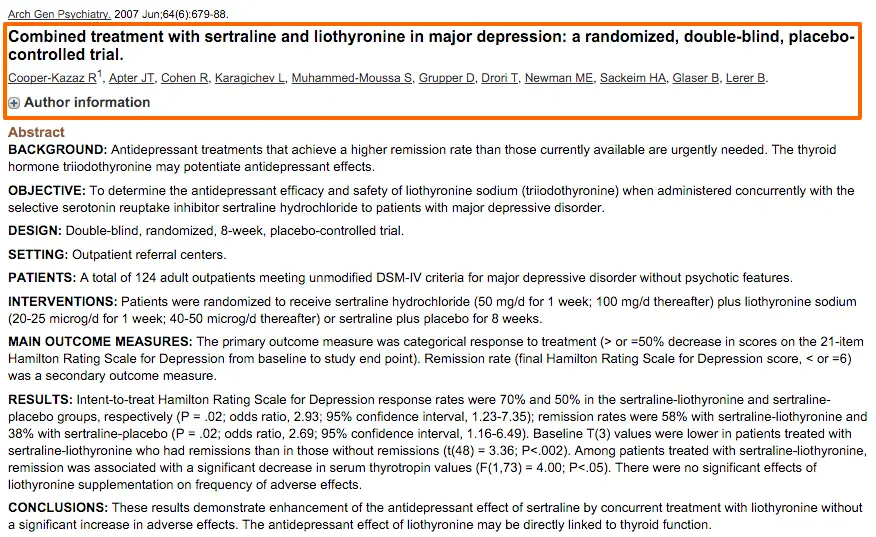
This study showed that adding Liothyronine or T3 medication to an antidepressant (in this case Sertraline) is more effective in treating depression than using an antidepressant alone.
Another very interesting point is that adding liothyronine did not increase the number of adverse events! (which is what more doctors are scared of when prescribing liothyronine).
And this isn’t the only study to show that adding T3 medication can help improve mood and reduce symptoms of depression.
Another study (2) showed that adding Liothyronine or T3 medication to T4-only medication resulted in “improved mood and neuropsychiatric function”.
Or how about this study (3) – which showed that adding liothyronine or T3 medication resulted in better mood AND decreased weight? (Maybe that’s part of the reason people weren’t so depressed!).
The list of studies showing how effective T3 medication or Liothyronine is in treating depression continues to grow.
But this begs an even bigger question:
Is Liothyronine a new amazing treatment for depression, or do we just really have that many undertreated hypothyroid patients running around?
Evaluating Depression
Remember that depression is a symptom, it is NOT a disease entity!
It’s a sign that something inside of your body is out of balance.
It could be related to hormonal imbalances, nutrient deficiencies, poor diet, emotional stress, or due to a number of other reasons.
The treatment for depression shouldn’t always be an anti-depressant!
This is how I look at diagnosing and treating depression in patients who see me in the office:
1. Complete Thyroid Serum Analysis
And I don’t mean just looking at TSH.
You will need a complete thyroid panel, including all of the following tests:
- TSH – Anything > 2.0 is a problem
- Free T3 – Should be in the upper 1/3 of the reference range
- Free T4 – Should be in the upper 1/3 of the reference range
- Reverse T3 – As low as possible, anything > 15 is a problem
- TPO antibodies and thyroglobulin antibodies – Both should be as low as possible
- Sex hormone binding globulin – Optimal in females = 70-80, optimal in males = 20-30
Don’t just get these tests but make SURE that they are in the “optimal” range!
Don’t settle for “normal” labs if you feel terrible.
Another important step here is to make SURE you are on the right type and dose of thyroid medication.
If you are currently being treated but still have symptoms of hypothyroidism, then you may need a different medication or a higher dose.
This article will show you how to properly test your body to see if your thyroid medication is working.
I’ve found that most of my patients do better when T3 has been added to their medication in some form. This could be from liothyronine or from NDT.
If you are having trouble getting your doctor to change your medication, you can also consider using supplements designed to enhance your thyroid & T3 status.
Supplements which contain selenium, zinc, and iodine may be particularly helpful in this regard.
I suggest a supplement such as this one, which has worked well for many patients.
2. Serum Inflammatory Markers
Inflammation in the body causes and is associated with Depression (4).
Because of this, make sure your doctor is looking for inflammation in your body.
I recommend the following tests:
- Erythrocyte sedimentation rate
- C reactive protein
- Homocysteine
It’s more important to find the CAUSE of the inflammation than just knowing that inflammation is present, but ordering the right tests is a good place to start.
I’ve found that a common instigator of inflammation in many patients is the hormone insulin (5).
This brings me to my next topic…
3. Other Hormone Imbalances
Hormone imbalances in the body can directly cause depression, or can indirectly cause depression by increasing inflammation.
That’s why it’s absolutely critical to order ALL of the following hormone levels:
- Testosterone – Low levels are associated with depression
- Insulin – High levels cause inflammation
- Estrogen balance – Too much or too little can cause depression
- Thyroid hormone – This is a MAJOR driver of depression when low
- Progesterone – Too little leads to estrogen dominance and can indirectly lead to depression
Not only will imbalances of these hormones lead to depression, they can also lead to weight gain and other problems such as joint pain, acne, and other chronic diseases!
That’s why I check these hormone levels on EVERY patient.
4. Social Stress & Emotional Trauma
Every single person is dealing with stress – whether they admit it or not.
The issue is that stress causes high levels of cortisol, and cortisol can lead to depression and weight gain.
While it may not always be possible to eliminate social stress from your life, it’s important to be able to manage it.
That’s why it is so important to practice techniques that help lower cortisol and calm down the body, like yoga, meditation, or daily spiritual prayer.
5. Replace and Replete Nutritional Deficiencies
Some very basic nutrient deficiencies can lead to or make depression worse.
It’s important to check these on every patient because we live in a world where food doesn’t have the same nutritional value that it once did, and we are more stressed than ever (causing further depletion of antioxidants in our bodies).
If you have depression, consider supplementing with the following:
- Omega 3 fatty acids – Low levels of omega 3 fatty acids can lead to depression
- Low levels of neurotransmitter precursors – including GABA and 5-HTP
- B complex vitamins, including B12 and B6 – Low levels of both are associated with depression!
- Vitamin D – Low levels of vitamin D may make you more vulnerable to developing depression (6).
These are just the basics, but they can certainly help get you started.
6. Consider Advanced Therapies like Neurofeedback
Sometimes it can be VERY difficult to treat depression.
And in these cases, it’s sometimes necessary to pull out the big guns.
In cases like these, I like to use a special therapy called neurofeedback (in addition to all of the above).
Studies have shown (7) this to be an effective and long-lasting treatment for depression.
What is Neurofeedback?
Neurofeedback is a special therapy designed to balance and recalibrate your brainwaves.
Special leads are placed on the head and brainwaves are measured (alpha, beta, theta, and delta waves).
Once these waves are measured, your brain is then compared to a database of over 100,000 other brains.
The computer algorithm then designs a treatment to “balance” and “recalibrate” your brainwaves to match the controls.
Treatment consists of 20 to 40 sessions where you are placed in front of a computer monitor with a movie playing.
When your brainwaves are congruent, the video will play – when your brain isn’t, the movie will shut off.
Each time this happens it retrains your brain to communicate with itself and recreate those pathways that have been lost.
This process happens as many as 70,000 times over the course of treatment!
Talk about some serious brain exercise…
Neurofeedback, when combined with the above treatments, can be VERY powerful for treating depression.
Using this sequence and combination you CAN take back your life and recover from depression.
Conclusion
If you’ve been suffering from Depression and you aren’t sure what to do, consider these steps:
- Check your thyroid function and if necessary try some T3 medication!
- Look for inflammatory markers and do your best to reduce inflammation if it is present
- Get tested for hormonal imbalances such as low testosterone or high estrogen
- Practice techniques to help reduce your stress
- Replace your nutrient deficiencies (Basic supplements can do wonders for many people)
- Consider advanced therapies such as neurofeedback if all else fails
It’s certainly possible to regain control of your emotions and your feelings but it may take some work on your part.
Now it’s your turn:
What have you tried for your depression?
What worked and what didn’t?
Leave your comment or question below!
Scientific References
#1. http://www.ncbi.nlm.nih.gov/pubmed/17548749
#2. http://www.ncbi.nlm.nih.gov/pubmed/9971866
#3. http://www.ncbi.nlm.nih.gov/pmc/articles/PMC3205882/#B15
#4. http://www.ncbi.nlm.nih.gov/pubmed/22553073
#5. http://www.ncbi.nlm.nih.gov/pmc/articles/PMC1483173/
#6. http://www.ncbi.nlm.nih.gov/pubmed/23568194
#7. http://www.ncbi.nlm.nih.gov/pubmed/24642756
